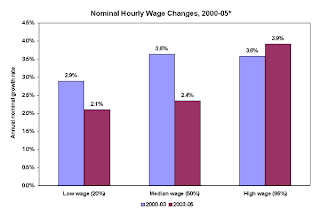Now that Bush has started handing out money to any corporation that says they are about to fail, lots more companies are looking to spread the wealth from the American tax payer to their personal shareholders. Now it's the car manufacturers putting their hands out. Some questions that should be answered before we do anything are: how did they get there, how will (or just "will") a bail out help them and how should a bailout be structured?
GM has been on the path to this point for years now. At least since 2004 (I don't have data that goes back further) GM has steadily been posting decreasing net profits (2006 being an exception). The sudden spike in oil prices over the past couple years has exasperated the problem, which is reflected in 2007's $42,000,000,000 net loss. Over the same time period, Toyota has moved more strongly into the American market (exceeding GM for net sales this year). Toyota has done this through a reputation of quality (which GM and Ford have both lost over the past couple decades), a wide selection of low priced cars, and especially the past couple years a record of fuel efficiency. Only in the past year have the American automakers refocused their message on fuel efficiency, often still falling short (due to their focus on SUVs, all of the hybrids from GM, et al have been SUVs, which still barely break the 20 mpg mark vs. 40-50 mpg Prius, etc.). Just this month we learned that the automakers are still bleeding millions of dollars a month, even as they attempt to retool their factories and cut their workforce.
This brings us to what the companies are asking for the money for. One of the biggest costs facing automakers is changing their plants from building SUVs and Hummers to more fuel efficient hybrids and Volts. This is key to these companies being viable in the near and long term future, but it is a huge cost. Due to the credit crisis of the past few months, lending that could have financed such changes has dried up. What the automakers believe is that if they can get the money to make the cars people want, people will start buying again and they will return to solvency.
Sadly, I'm not completely sure this will be the case. The credit slow down has affected more than just banks and corporations. Buyers also are unable to get credit. Also, much of the purchasing power of American consumers in the past few years has been due to increasing home values and decreasing costs of borrowing on those houses. Now, with both of those reversing, the consumer just can't afford to buy a new car. This is reflected in the fact that even Toyota's sales are negative this past quarter. Also, because GM, Ford and Chrysler have been so slow to get into the hybrid market, it will take time to convince consumers that they are comparable to the Priuses and Civic hybrids of foreign automakers.
Because of this, I don't think we should or even can do a bail out similar to the one proposed for the bad mortgages. NPR's All Things Considered last night did a segment on the Chrysler bail out from 1979. Then, instead of directly giving Chrysler the nearly $2 billion, the government only insured the loans banks gave to the companies. In return, the government got preferred stock, required detailed plans on Chrysler's restructuring, and ensured that if Chrysler went bankrupt that it would get repaid first. Because of this action, Chrysler returned to profitability quickly and wound up paying off the loans seven years early and the government made money on the deal.
I believe a similar set up would be even easier to achieve now. The government, through the TARP law, has much more leverage over banks that could finance such loans. After the buyout of AIG, the government controls roughly 70% of the country's largest insurer. Through these two entities, we could potentially help both the auto industry and, depending on the success of the automakers, ensure long term solvency to the banking industry. This will also keep the government from being on the line for yet another $50 billion that we just simply can't afford right now.
The biggest problem right now is that the banks still aren't lending though. In the past couple weeks since the TARP package was passed, the rate banks lend to each other has dropped more than 4%, yet the rate banks lend to borrowers and to corporations has still remained high. Loosening that up, with targeted goals in mind, is going to be one of the best ways to get the economy moving again. There are two ways to loosen that up, and I think both should be taken: 1) Get money flowing to the middle class, which is where most of the consumer debt is held. You can do this through tools such as the stimulus checks of earlier this year, increased unemployment benefits during this slow down, and tax incentives for job creation. 2) Get loans moving to corporations again. The best ways of doing this are through insuring loans to targeted industries (green energy, infrastructure, automotive to name a few) and tax incentives for targeted initiatives (hiring and green energy again). The problem all along has been a trust issue, so if we can increase the trust, we may be able to pull out of this tailspin and not leave our children with $20 trillion in bad debts to collect.













